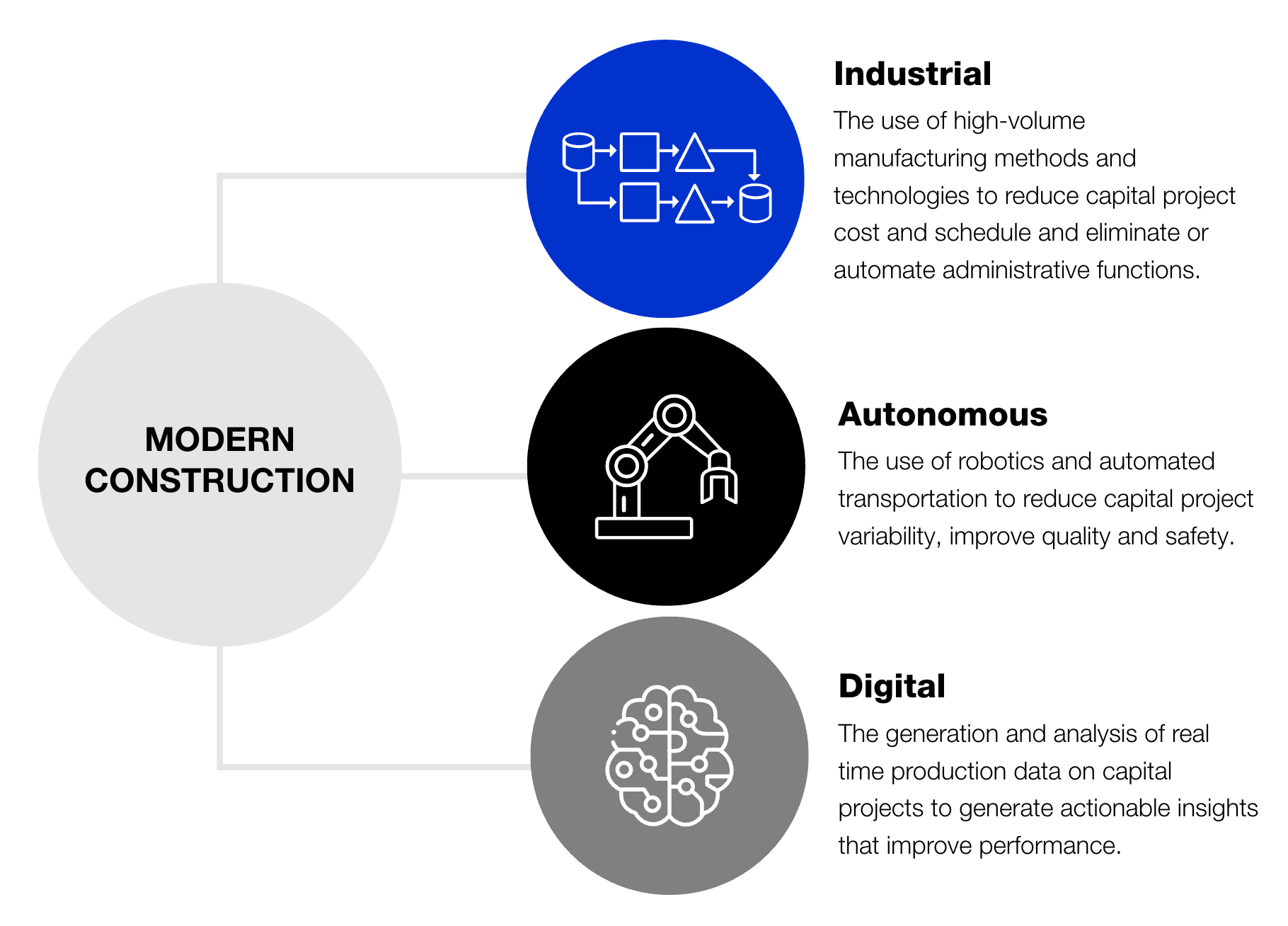
Recent developments with AI and other technologies are radically changing the construction industry. The next wave of innovation in the global engineering and construction industry combines the effective application of operations science together with advanced technologies—including AI, ML, robotics and automation—to unlock radically better project performance and transform how complex projects are delivered.
The Stanford Engineering Center for Global & Online Education (CGOE) and the Project Production Institute (PPI) are collaborating to accelerate industry adoption and create impact beyond what is currently thought possible.
The Modern Construction Program, offered by PPI in collaboration with Stanford Engineering Center for Global & Online Education, guides participants through an intensive eight-month journey that bridges theory and practice. Grounded in rigorous technical frameworks and enriched by the application of leading-edge technologies, the program enables participants to address real opportunities within their own organizations — equipping them with both insight and practical tools to drive measurable project improvement.

Enrollment applications are now being accepted for the next Modern Construction Program, which will be held July 2026 through February 2027. Due to the hands-on interactive nature of this popular program, combining in-person learning and monthly mentorship, limited spots are available - apply early to secure your participation.
A five-day and in-person introductory workshop that includes interactive sessions and hands-on experiences including labs to be held at Stanford University the week of 13-17 July 2026.
A six-month period of application of what was learned during the introductory workshop on a real-life work project including monthly check-ins with insights and guidance provided by Stanford / PPI program mentors
A one-day virtual mid-term session in late fall 2026 facilitated by Stanford / PPI instructors
A two-day in-person workshop to be held at the Stanford University campus on 09-10 February 2027 for participants to present their project application results and learn from peers

Prior to the five-day Introductory Workshop, all participants will be required to identify and map a specific project production process they deal with daily.
In preparation for the program, participants will:
Attend a 2-hour session to be trained on how to identify and effectively map production processes using PPI’s Process Mapper tool.
Submit a map of their selected production process stating what the process produces, the operations in the process, specific routings that depict how work is expected to flow, and an indication of what metrics determine whether the process is effective and efficient.
Evaluate current performance of the selected production process and suggest one idea for improvement based on the participant’s experience.
The Introductory Workshop of the Modern Construction Program will be hosted on the Stanford University campus.
Through a series of lectures, interactive and hands-on sessions led by Stanford faculty and PPI instructors, the Introductory Workshop will enable participants to do a deep dive into all elements of Modern Construction and understand how they are connected, including how they impact performance. This will enable participants to gain sufficient knowledge to start applying Modern Construction in their projects and organizations.
On day one of the workshop participants will get to know each other, their roles and why they enrolled in the program. After an overview of Modern Construction and its components, participants will immediately start exploring and understanding how production systems behave through the lens of Operations Science, and the application of fundamental laws of production and relationships between cycle time, capacity utilization, throughput, variability, etc.
Having explored the fundamentals, on day two participants will start a journey to understand the application of high-volume manufacturing methods and technologies including product development methods and advanced production strategies, to reduce capital project cost and schedule and eliminate or automate administrative functions – what Modern Construction refers to as Industrial. This will be complemented with the use of robotics and various technologies to reduce capital project variability, improve quality and safety based on the ability to self-regulate / control using data collected in real time – the autonomous side of Modern Construction.
On the third day, participants will explore the third leg of Modern Construction – Digital. More specifically, the generation and analysis of real-time production data on capital projects to generate actionable insights that improve performance through the application of platforms interconnected with machine learning, IoT, AI, RPA, AR / VR and using data science. By the end of the third day, participants will understand how all components of Modern Construction are connected to deliver unparallel benefits and accelerate innovation.
Participants will be asked how their learning can be applied to the production process they mapped prior to the start of the Introductory Workshop. This will be further addressed on the fourth day as the connection of all the Modern Construction elements with Operations Science, including impact of industrialization, autonomy, and digital to production processes, will be made.
The last day of the Introductory Workshop will be fully dedicated at exploring a series of techniques that assist with the effective adoption of Modern Construction as well as for participants to develop and present their individual plans for implementation.

Following the Introductory Workshop, participants enter a six-month period of application and “learning by doing”. Using the plan developed on the last day of the workshop participants will work on a set of project deliverables provided by Stanford and PPI to practice the application of Modern Construction in the real world and learn from it to prepare them to lead the transformation of their organization to modernize.
Participants will generate monthly interim reports and meet monthly with their assigned program mentors to discuss progress and challenges and receive coaching.
The Modern Construction Program includes a 1-day virtual mid-term session in Fall 2026 facilitated by Stanford / PPI instructors with two main objectives: 1) enable program participants to further exchange their application experiences including sharing opportunities they are exposing, application challenges as well as discuss ad share next steps in their respective applications, and 2) reinforce key concepts, frameworks, methodologies, and use of tools so participants can effectively continue with the rest of the application period.
The virtual midterm session will:
Finally, participants will prepare a final report summarizing their application experience, results and what they plan to do next.
A two-day in-person workshop to be held at the Stanford University campus, where participants will present their project application results and engage with peers. Optional visits to local companies may follow the two-day program and will occur after the program.



"It was a pleasure and honor to share my final implementation of the Modern Construction Program at the Project Production Institute Symposium in Stanford University with more than 130 professionals around the world. I am implementing these concepts in my company Produktiva Constructora with great success.
This will be one of the benchmarks in the construction industry in Peru and in the world. A great learning experience.
Thank you for the opportunity Roberto J. Arbulu H. James Choo and Martin Fischer."
"As part of the activities of the Integration Workshop of the Modern Construction Certification Program that takes place this week in Stanford University, I had the opportunity to visit the Stanford Robotics Center. This laboratory is a space where cutting-edge technology comes to life, promoting the vision of a more efficient, autonomous and sustainable construction industry.
Robotics and automation are transforming the way we think about engineering and construction projects. During the visit, we explored how these technologies not only optimize processes, but also reduce risks and increase accuracy in project execution.
These types of experiences underscore the goal of the Modern Construction program: to combine science, technology, and sustainability to reimagine the future of our industry."

Professionals responsible for the delivery of capital programs and projects including engineering, fabrication and offsite assembly, construction, commissioning, maintenance operations and associated support functions.
$14,950
"*" indicates required fields
For more information and to enroll your organization, contact modconstruction@lists.stanford.edu